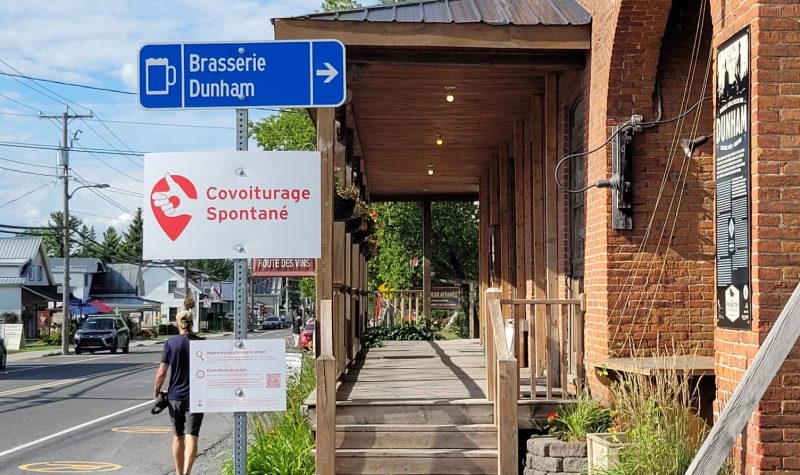Brome-Missisquoi is seeing a new spontaneous ride-sharing initiative called “Project Caravane.”
Project Caravane is a citizen initiative that was formed a couple of years ago, but it was put on hold throughout the pandemic. The initiative involves setting up ride-sharing stops, similar to bus stops, at different hotspots throughout the region.
Each of these stops will have a sign written “Covoiturage Spontané” (spontaneous ride-sharing) to show drivers that anyone standing there is seeking a lift through the ride-sharing initiative. The initiative is in its first phase of development, but Alexandre Legault, co-founder of Project Caravane, said that it’s so far proving to be efficient.
“What our group really wants to do is to bring solutions to one major issue we have here in the region and rural areas everywhere in Quebec. We are heavily dependent on our cars,” said Legault. “That means it has become a major financial burden for us to get around, to go to work, to go to school, to do groceries or anything else since the price of fuel is really high. There is also the environmental cost of it.”
While seeking alternatives, the group was inspired by similar initiatives in Europe.
“What we don’t have is spontaneous ride-sharing. We saw many initiatives in Europe, mostly in France, where they would use these systems in rural areas where people would meet up at these ride-sharing stops, which are basically like bus stops,” explained Legault. “When you go there, you expect someone to pick you up just like if you were hitchhiking, but it’s a designated ride-sharing stop instead. That’s what we are putting in place this summer.”
The group is testing Project Caravane throughout the summer to see if it is something that is efficient and needed in the region. They have already put up signs in Sutton, Cowansville, Dunham, Frelighsburg, and Bedford.
“We want to test how long it takes before someone picks you up and we have already tested it out in the past months. Now, in the last few weeks since the signs are up, it turns out it is efficient so far. Most of the time, people wait less than five minutes. Very rarely, less than 10 per cent of the time, it is less than 10 minutes,” mentioned Legault.
From the feedback they have received so far, Legault noted that people are more than willing to pick up a passenger.
“There are many cars on the road already and we figured out that a lot of drivers will pick you up even if you aren’t related to the initiative. (…) We have older people telling us, ‘I used to to get around by hitchhiking when I was your age.’ Turns out we just need passengers to test it out this summer to get more information,” he said.
Taking into consideration safety matters, Legault explained that they are setting up signs in safe locations for passengers and drivers and giving tips as to how to use the ride-sharing initiative properly. He also mentioned that feedback of the ride-sharing experiences will be published on Project Caravane’s Facebook page and website to help people with their judgement.
‘It is something that we will keep working on as we want to eventually, maybe, develop an app in the next phase of the project that will give more safety to people, but someone told me something very important the other day,” explained Legault. “Someone was telling me, we don’t see hitchhikers anymore and it’s not because it’s not safe. If anything, it’s safer since we all have phones in our pockets. It’s not because it’s not safe. It’s because everyone has a car and back then it wasn’t the case.”
For more information about Project Caravane or to partake in the initiative. An English version of the website is in the works.
Listen to the full interview below:


